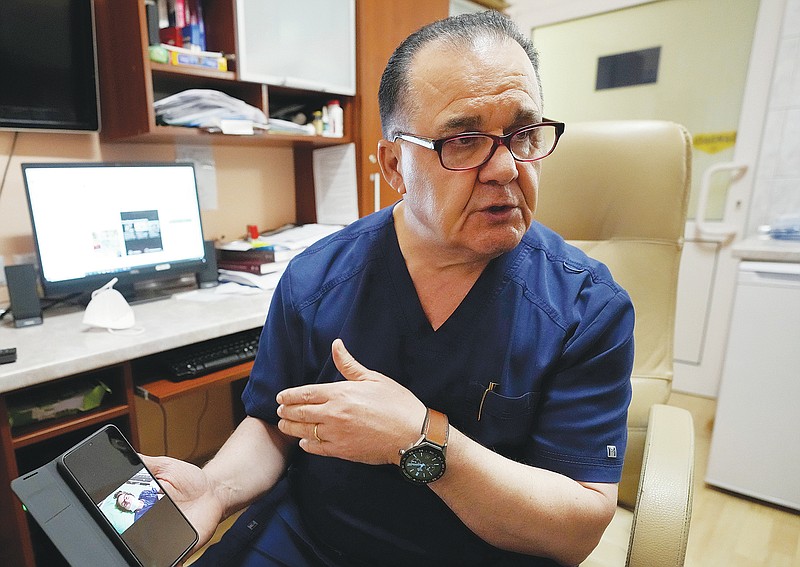BIELSK PODLASKI, Poland -- Dr. Arsalan Azzaddin was seeing migrants from Iraq and Syria being brought into a hospital in eastern Poland every day with hypothermia, pneumonia, broken bones and severe dehydration. So he asked a Kurdish TV channel to let him go on the news to warn people in his homeland not to attempt the dangerous journey into the European Union through the Belarus-Poland border.
"I want them not to come. They could die," Azzaddin told The Associated Press on Monday.
At first, the medical director of the Bielsk Podlaski hospital was accused by some viewers of doing the bidding of the Polish government, which has taken a hard line in seeking to keep out migrants, using razor wire and a show of border police and military to stop attempts to sneak across the EU's eastern border.
So he returned again to Kurdish TV, this time letting his patients describe their suffering from their hospital beds.
And he also had a message for the Iraqi leaders: "Save those people," he said. "Kurds don't deserve something like this."
Only days later, the Iraqi government began taking steps to stop the migration of Iraqis, many of them Kurds, to Belarus. They halted flights to Belarus, closed offices that issued travel visas to Belarus and sent government planes to bring stranded people there back home.
EU officials also mounted pressure on Iraq to halt the migration, but Azzaddin is convinced that his appeals on TV, which he said reached 2.5 million viewers, played a significant role.
Azzaddin, originally from Irbil in the Kurdistan region of Iraq, has lived in Poland for 40 years. His hospital in Bielsk Podlaski, a town of 25,000, is located 20 miles from the border with Belarus, which migrants and refugees, mostly from the Middle East, have been trying to cross since the summer in hopes of finding better lives in the EU.
The EU accuses the authoritarian leader of Belarus, Alexander Lukashenko, of orchestrating the migration in retaliation for sanctions imposed on Belarus over a presidential election in 2020 that was widely viewed as rigged and a harsh government crackdown on peaceful protesters.
Most of the migrants seek to reach Germany or elsewhere in Western Europe. But after 1 million refugees came to the EU in 2015, the bloc has sought to keep out any large new groups of asylum-seekers. The way it has done so, tacitly allowing the pushbacks of migrants and outsourcing migration control to Libya and Turkey, has prompted rights groups to accuse the EU of abetting human rights abuses.
With Poland's border increasingly sealed, it has gotten harder and harder for migrants at the border. Many are getting trapped in a dank forest of bogs that sees subfreezing temperatures at night. There have been reports of at least a dozen deaths along the border, and Azzaddin believes there are more on the Belarus side, based on his monitoring of social media posts.
With flights to Belarus from the Mideast coming to a halt, Azzaddin says he believes there are no more migrants in Poland's forest but there are still 2,000 people on the Belarusian side.
Azzaddin said his hospital had lately been receiving two to five migrants a day needing urgent medical treatment. One was a Syrian woman who suffered a miscarriage after being stuck in the forest for 22 days. When she was finally taken to the hospital, she caught covid-19. The woman, a 38-year-old from Aleppo, was escorted away from the hospital on Monday by Border Guard officers who would not let AP journalists speak to her.
Azzaddin supports the strict Polish approach to migration. He says if Poland were to allow in all the people that Belarus was shepherding to the EU's doorstep, the numbers would only grow and Lukashenko would prevail in his geopolitical standoff against the West.
The problem, he says, should be addressed at its roots. He sharply accuses Iraqi authorities of failing to create conditions where people can have dignified lives.
"You have to ask why people are coming," he said. "The leaders of many countries, of the United States and the European Union, must ask the Iraqi authorities why people are fleeing. These are educated people. They don't have work; they don't have anything to survive on."
He supports immigration but wants to see it happen in a legal, controlled way.
"We must teach young people that the illegal way is not a good way. If you have an education, look for a job, do it legally," he said. "I am the medical director of this hospital. If 20 doctors wanted to work here, I could give them work tomorrow. But they must fulfill certain requirements. Coming here by risking the death of your family and children is not a good way."


